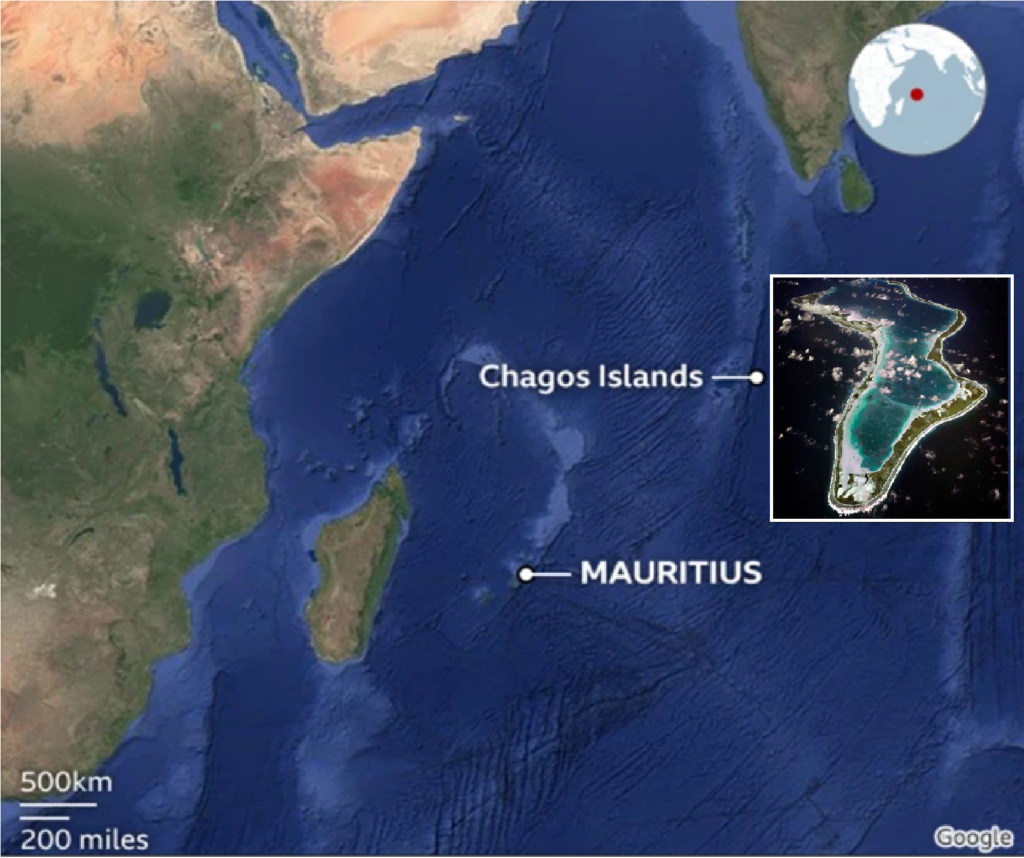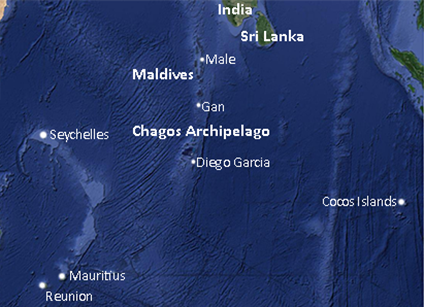
- India played a “quiet but important role” in the background during the two years of discussions between Mauritius and the United Kingdom, pushing both parties to engage in open dialogue to reach a mutually beneficial agreement.
- The base in Diego Garcia is vital to defence and intelligence operations in the Indian Ocean, the Persian Gulf, and even the larger Indo-Pacific area.
- the accord fortifies India’s relations with Mauritius, a country where approximately 70% of the populace is of Indian descent, hence reinforcing the historical and cultural bonds between the two nations.
What was at issue in the Chagos dispute?
The 58 islands that make up the Chagos Archipelago span an area of 60 square kilometres, and they are located roughly 2,200 kilometres northeast of Mauritius and 1,700 kilometres southwest of Thiruvananthapuram, India.
The islands were a part of Mauritius while it was still known as Ile de France, a French colony, at least as far back as the 18th century. But in 1965, the United Kingdom annexed the Chagos Archipelago to establish the British Indian Ocean Territory (BIOT), paving the way for Mauritius’s independence from British colonial administration.
A covert agreement with the US to build a military installation on Diego Garcia, the group’s largest island, served as the main impetus for this action. Since the 1960s, the forcible expulsion of the native Chagossians from their country has given rise to debate and international legal challenges.
The International Court of Justice declared in 2019 that it was unlawful for the UK to continue running the Chagos Islands and demanded that Mauritius regain control of the islands. In response, the United Nations General Assembly (UNGA) passed a resolution reiterating Mauritius’s sovereignty over Chagos and requiring the UK to leave the territory.
What role has India played in these negotiations?

India has been a consistent supporter of Mauritius’s claim to the Chagos Archipelago, matching its stance with ideals of decolonisation and territorial integrity. It has been opined that India played a “quiet but important role” in the background during the two years of discussions between Mauritius and the United Kingdom, pushing both parties to engage in open dialogue to reach a mutually beneficial agreement.
New Delhi “firmly backed the principled Mauritian position, supporting its stance on the need to do away with the last vestiges of decolonisation,” according to official Indian sources. For many years, the centre of international security activities has been Diego Garcia, a strategically significant military installation. The base is vital to defence and intelligence operations in the Indian Ocean, the Persian Gulf, and even the larger Indo-Pacific area. It is jointly utilised by the United States and the United Kingdom.
Although Mauritius maintains sovereignty over Diego Garcia, the UK is granted some sovereign rights and authority over the base’s operations as part of the final agreement struck between the two countries.
“This agreement affirms Mauritian sovereignty over the Chagos Archipelago while granting the United Kingdom the authority to exercise Mauritius’ sovereign rights with respect to Diego Garcia,” said US President Joe Biden, praising the accord.
India views the resolution as a positive step toward bolstering security in the Indian Ocean. It has been strengthening its marine policy and forming alliances with important countries like Mauritius, Seychelles, and Madagascar in response to China’s expanding influence in the region.
The Chagos resolution advances regional security and stability in line with India’s long-term geopolitical objectives, which fit within this larger strategic framework.
Why does this development matter?
The world community has hailed Mauritius’s accomplishment of completing its decolonisation process with the repatriation of the Chagos Islands. “This important agreement will strengthen long-term security in the Indian Ocean region and complete the decolonisation of Mauritius,” an official statement from the Indian Ministry of External Affairs stated.
Even though its participation has been mostly behind the scenes, India’s impact on world politics is expanding. India has reiterated its commitment to international law and the values of sovereignty by supporting decolonisation and territorial sovereignty.
Additionally, the accord fortifies India’s relations with Mauritius, a country where approximately 70% of the populace is of Indian descent, hence reinforcing the historical and cultural bonds between the two nations.
Even if Mauritius nominally regains its sovereignty from the United Kingdom, the security measures around Diego Garcia guarantee the Indian Ocean’s continuous stability. India was crucial to the success of these negotiations with its understated but important support. Therefore, everyone involved—Mauritius, the UK, the US, and India—sees the arrangement as a win.
India was crucial to the resolution of the long-running conflict over the Chagos archipelago, despite her quiet contribution. India tacitly backed the historic deal, which gave Mauritius back control of the islands following two years of talks. Supporting decolonisation and bolstering security in the Indian Ocean, India solidified its strategic alliance with Mauritius.
References:
- FP Explainers- 2024 Diego Garcia https://www.firstpost.com/explainers/how-india-quietly-pushed-uk-to-return-chagos-islands-to-mauritius-13821944.html
- Mago, Shivangi – The Print/2024 https://theprint.in/world/uk-to-hand-over-chagos-islands-to-mauritius-roots-of-decades-old-dispute-what-deal-means-for-us-base/2296252/
Prajwal K M holds a Master’s in Diplomacy, Law, and Business with a specialization in Economics and Foreign Policy. He is currently a consultant at the Nation First Policy Research Centre (NFPRC), a Delhi-based think tank working on policy design and implementation with the government. Formerly Deputy Editor at SamvadaWorld, his work focuses on the political and economic landscapes of West Asia and North Africa.
